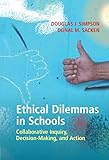Ethical dilemmas in schools :
Material type: TextPublication details: Cambridge 2021Description: 245 pages cmISBN:
TextPublication details: Cambridge 2021Description: 245 pages cmISBN: - 9781108491471
- 9781108798334
- 370.11/4 SIM
| Item type | Current library | Collection | Call number | Status | Date due | Barcode | |
|---|---|---|---|---|---|---|---|
 Reference
Reference
|
Mahindra University Indira Mahindra School of Education General Stacks | Education | 370.11/4 SIM (Browse shelf(Opens below)) | Not for loan | E0093 |
What can educators expect from ethics? -- What does sympathy or empathy have to do with ethics? -- How are ethical principles useful? -- What does regard for people imply? -- What is a problematic ethical situation? -- What are the qualities of an ethical education? -- What are the characteristics of a good school?
"Casuistry is probably not a word you employ in your everyday vocabulary. But I suspect that the practice of casuistry is nonetheless part of your ethical repertoire. What I mean to suggest is, you make use of actual cases of shared experience to generate ethical principles of care, justice, and responsibility and you apply already available ethical principles to new cases as they arise in an infinite and perhaps imperceptible cycle. This is a practice John Dewey learned from Aristotle and one that Doug Simpson and Mike Sacken learned from Dewey. It is a practice deeply woven into the fabric of Ethical Dilemmas in Schools: A Collaborative Approach to Inquiry, Decision-Making, and Action"--
There are no comments on this title.

